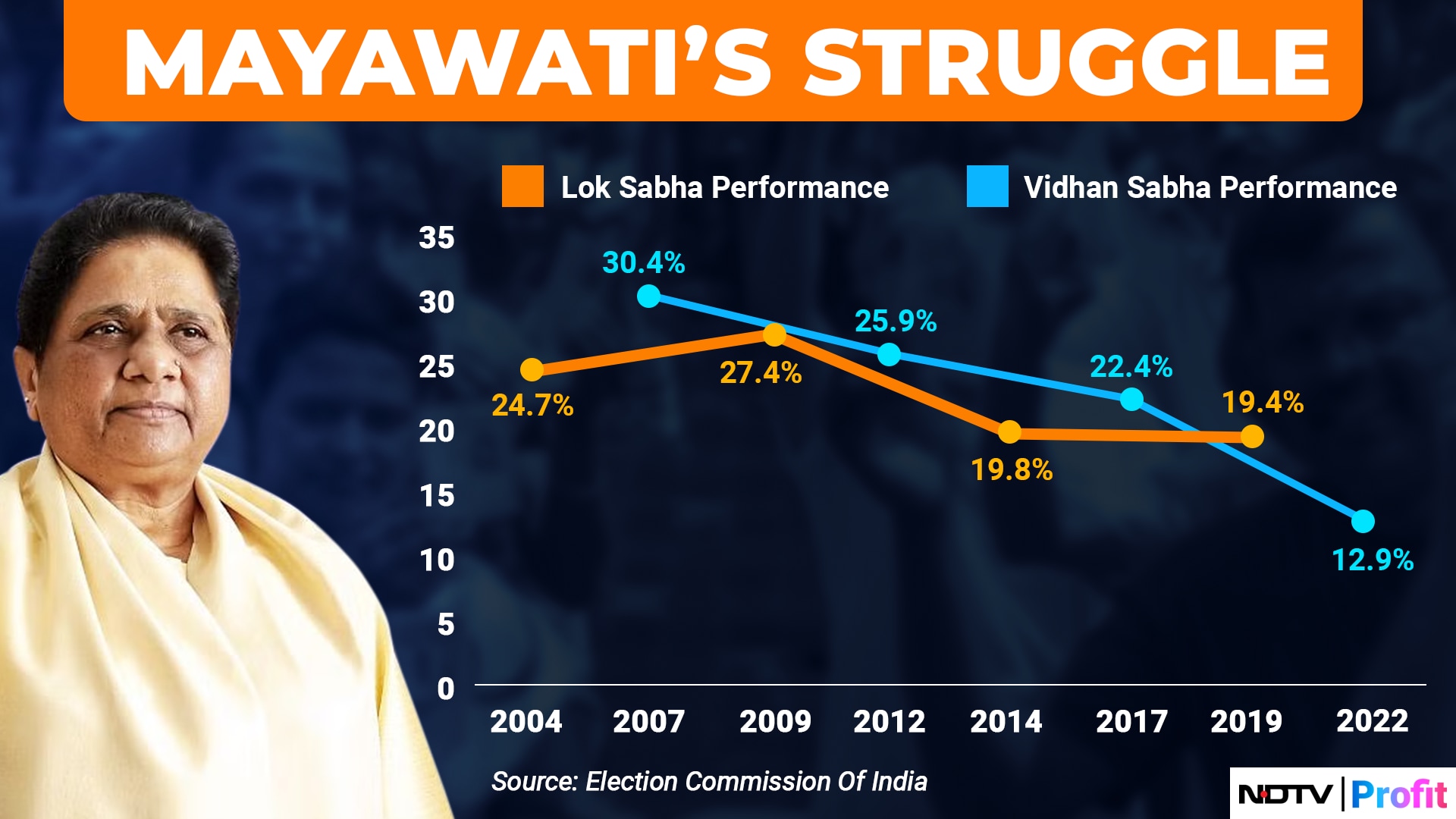
Uttar Pradesh, with 80 seats, holds the keys to power in Delhi, and the competition in 2024 is starkly different compared to 2019. The BJP has formed an alliance with the RLD, SBSP, and NISHAD parties. SP and Congress have joined hands under the INDIA bloc. Meanwhile, BSP, which previously contested alongside SP in 2019, is now contesting independently, resulting in a three-way contest.
UP is the epicenter of the Ram Mandir movement, and the BJP hopes the temple's inauguration and split of opposition votes will help it compensate for losses in 2019.
BSP On A Declining Path!
BSP, once a formidable player in UP politics, was reduced to just one seat in the 2022 Vidhan Sabha elections, with even Congress and Raja Bhaiyya's party getting a higher number of seats than behen Mayawati.
When the party formed government on its own in 2007 in the state, it recorded a vote share of 30.4%. This was reduced to 19.6% in the 2014 Lok Sabha elections when it failed to open its account.
In the 2019 general elections, riding on alliance with Akhilesh Yadav's Samajwadi Party called Mahagathbandhan (MGB), it maintained its vote share, winning a handsome 10 seats, a gain of 10.
The SP did not benefit from this alliance as it could not add on to its 5-seat tally of 2014. The alliance received 70% plus votes from the Muslim, Yadav, and Scheduled Caste communities.
It is widely believed that while the SP managed to transfer Muslim and Yadav votes to BSP candidates, it didn't receive the same reciprocity with respect to Scheduled Caste votes. Interestingly, after the BSP benefited from the alliance, it broke ranks with the SP and contested the 2022 state elections separately.
This decision proved disastrous for the BSP, as its vote share declined to 12.9%, a decline of 9.3% compared to the 2017 Vidhan Sabha polls, and it could win just 1 seat, that is, down 18 seats.

BSP Losing Core Support
In the 2022 Vidhan Sabha polls, the BSP lost support across major caste groups like Yadavs and Kurmis (-8% each), Muslims (-16%), and non-Yadav OBCs (-13%). What was striking is that it also lost support amongst its key constituents: the Dalits Jatavs (-24%) communities, from which Mayawati hails, and the non-Jatavs (-28%).
In fact, the BJP and SP have emerged as the number 1 and number 2 parties amongst non-Jatavs, pushing the BSP to third place. Over the years, it lost support amongst Brahmins and Thakurs, which propelled Mayawati to victory in 2007.

In a bipolar election, the BSP was sidelined by the opposition voters, who preferred to vote for the SP as it was better suited to beat the BJP. The fact that BSP has been branded as the B-Team of the BJP by other opposition parties also seems to have hurt Mayawati's prospects in the past 5 years.
In 2007, the BSP crafted a sarvjan strategy, replacing its bahujan strategy, to form a single-party government. However, today, 80% of its vote share comprises support from the anchor voting segments of Jatavs and non-Jatavs Dalits, making it a party representing Dalits.

Who Benefits If BSP Declines From Here?
The decline of the BSP in the 2022 Vidhan Sabha elections largely helped the SP (70%), mainly Muslim and Yadav votes, as well as the BJP (30%), mainly non-Jatav votes, as shown in the graph below.
It is believed that the BSP could lose further vote share from here since it is contesting alone and is not in the reckoning to defeat the BJP on most seats. Both the BJP and SP are eyeing its vote bank.
Today, the BSP vote share consists primarily of Jatav and non-Jatav Dalit voters. If the BSP loses more vote share, then more non-Jatavs could move towards the BJP. In the 2022 state elections, the BJP received 51% non-Jatav support as per the Axis My India exit poll.
The BJP has successfully wooed the community by giving higher representation to non-Jatavs in ticket distribution by the Yogi ministry. It also played up the fault lines between Jatavs and non-Jatavs to woo the non-Jatav Dalits.
It has been able to do so by spreading the narrative that they have received lesser reservation benefits vis-à-vis Jatavs as Mayawati favours her own caste people.
If BSP declines further, there is a possibility that Jatavs, seeing non-Jatavs get higher representation in power, may veer towards the BJP, thus helping the saffron party, just like how BSP's weakening helped SP in the 2022 state elections.
Another argument is that since Jatavs and non-Jatavs are at loggerheads with each other, Jatavs, if at all they move, could shift to SP even though Muslims and Yadavs have had a history of uneasy relationships with Dalits in the state.

However, if BSP gains vote share, then it is highly likely that it comes at the expense of SP, as it gets back a section of Muslim and non-Yadav OBC votes lost during 2022. To woo the community, which makes up roughly 18% of the state's population, the BSP has fielded 30% Muslim candidates. In this case, Mayawati could significantly damage the plans of the INDIA bloc of the SP and Congress.
To sum up, the BSP won 10 seats in alliance with the SP in 2019. All of these are up for grabs in 2024. Who gets to win them, the BJP or the SP, or will the BSP spring a surprise? Only time will tell.
Amitabh Tiwari is a political commentator, strategist, and consultant advising political parties and leaders. He was previously a corporate and investment banker.
The views expressed here are those of the author, and do not necessarily represent the views of NDTV Profit or its editorial team.
Essential Business Intelligence, Continuous LIVE TV, Sharp Market Insights, Practical Personal Finance Advice and Latest Stories — On NDTV Profit.























